Production of plastic rose from 2.3 million tons in 1950 to 448 million tons by 2015. Production is expected to double by 2050.
The majority of the plastic filling the landfill is the result of product packaging. And while the answer to it may seem straightforward i.e. sustainable packaging, a lot goes into both the packaging of products and the packaging those products are transported in.
For instance, the beverage packaging industry’s biggest issue would be insoluble leakage-proof material. Similarly, in the case of shipping materials, packing peanuts and bubble wrap are both necessary evil if you wish to ship something fragile.
Many companies are now working on innovative sustainable packaging which is truly one-of-a-kind solutions to our environmental problems. Let’s see what some of them are.
1. Eco-friendly Pasta Boxes made from Food Waste
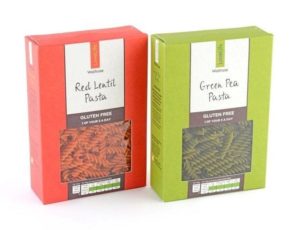
Waitrose is a U.K.-based company that packages its pasta in eco-friendly boxes. The boxes are made from salvaged food waste such as peas and pulses that are unsuitable for the production of the pasta. The un-usable raw foods are saved and used in packaging instead of being thrown away.
The packaging will be made from 15% food waste. The company claims that this will reduce the use of virgin tree pulp by 15% and will lower greenhouse gas emissions by 20%.
And since the box is in direct contact with the pasta, it eliminates the need for an inner sleeve within the pack. The pasta box is also 100% recyclable.
2. Edible Drinking Water Bubble by Skipping Rocks
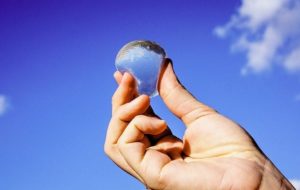
Skipping Rocks Lab developed an alternative to plastic bottles, their Ooho! bubbles store drinking water within an edible membrane.
If someone doesn’t wish to eat the membrane, it’s no issue as the bubble is made from natural seaweed extract which biodegrades in 4-6 weeks. The membrane can be flavored and colored. And is not limited to water, it can be used to hold other liquids such as soft drinks and cosmetics.
3. Ari Jónsson’s Seaweed Bottles

Ari Jonsson a design student created a fully biodegradable bottle made from algae. The bottle retains its shape and solidness but once it’s empty the bottle begins to decompose and turn into its natural form. Moreover, the bottle is edible.
He began studying the strengths and weaknesses of different materials to determine what could be suitable for use as a water bottle. Eventually, he came across a powdered form of agar, a substance made from algae. He discovered that agar mixed with water forms a jelly-like substance.
“If it fails, or if the bottom is too thin or it has a hole in it, I can just reheat it and pour it into the mould again,” said Jónsson.
4. Edible Spoon by Bakeys
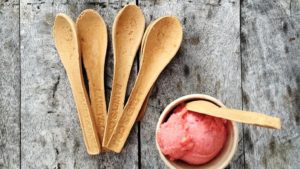
Bakeys, an Indian cutlery company makes vegan and biodegradable, and edible spoons. The spoons are made with rice, wheat, and sorghum and come in three flavors! One can choose flavors like vanilla, strawberry along with other popular ones.
Their aim was to make spoons that don’t have to be washed or harm the environment. The spoons contain no chemicals, additives, or even preservatives and are made from food materials with highly nutritive content.
5. ‘Future Smart’ 100% renewable Paper Cup from Huhtamaki
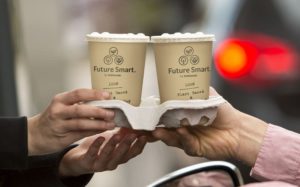
Huhtamaki is making a 100% renewable cup for holding both hot and cold beverages. The material is certified by the Programme for the Endorsement of Forest Certification (PEFC) and created using plant-based materials. The paper cup utilizes a newly developed polyethylene that’s plant-based which prevents liquids from permeating the cup too quickly.
The environmental effects of plastic prompted the development of the ‘Future Smart’ paper cup by packaging manufacturer Huhtamaki.
The ‘Future Smart’ cup is described by the brand’s Vice President of Innovation, Richard Skidmore: “Huhtamaki’s Future Smart paper cup solution is a giant leap forward in substituting fossil oil-based plastics in packaging with a fully renewable and economical next-generation, plant-based material.”
6. Recycled Chocolate Waste Wrap from cocoa beans skins
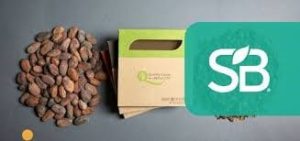
James Cropper, a UK paper manufacturer created a sustainable wrapper that can be used for wrapping chocolate bars. It is an innovative recycling process that incorporates cocoa husk waste from chocolate production into unbleached cellulose fiber. This cellulose fiber can be used to produce food-grade recycled paper.
This innovation can save the skins of many of the 3.5 million tonnes of cocoa beans produced each year. The finished product is made up of unbleached cellulose fiber from sustainable crops, features a 10% cocoa husk content, with the cocoa waste materials being delivered to the mill in palpable bags. This means they can be incorporated into the paper-making process without the need for any additional processing.
So the users get chocolate wrapped in chocolate!
7. EnviGreen Offers Plastic Alternatives That are Completely Biodegradable
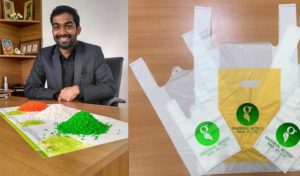
EnviGreen an Indian company that makes 100% organic bags that are completely biodegradable and provide an environmentally friendly alternative to plastic versions. The company aims to replace the everyday use of plastic bags.
The organic bags are made out of natural starch and vegetable oil derivatives. They are designed to be non-toxic to plant and animal life. The bags soften in water and disintegrate in hot water.
8. The ‘LIDfree’ Paper Cup Eliminates that Need for a Plastic Lid
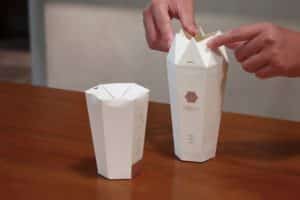
The ‘LIDfree’ is an eco-friendly paper cup that eliminates the need for a separate plastic lid and thus makes it easier to recycle once it has been used.
The cup flaunts an origami design on the top that can be folded down once the cup is filled with drink. It will be an eco-friendly solution for restaurants and cafe
The ‘LIDfree’ paper cup has been designed by Chia-Chun Chuang and Pei-Chun Hsueh, winners of the 2020 Golden Pin Design Award.
Conclusion
While a lot of research and developments are happening in the field of Sustainable Packaging it’s important to make sure that the alternatives are not only environment friendly but also economically sound.
Hopefully, with government support and push for eco-friendly products from consumers, many companies will not only adopt but come up with more eco-friendly AND pocket-friendly packaging solutions.


